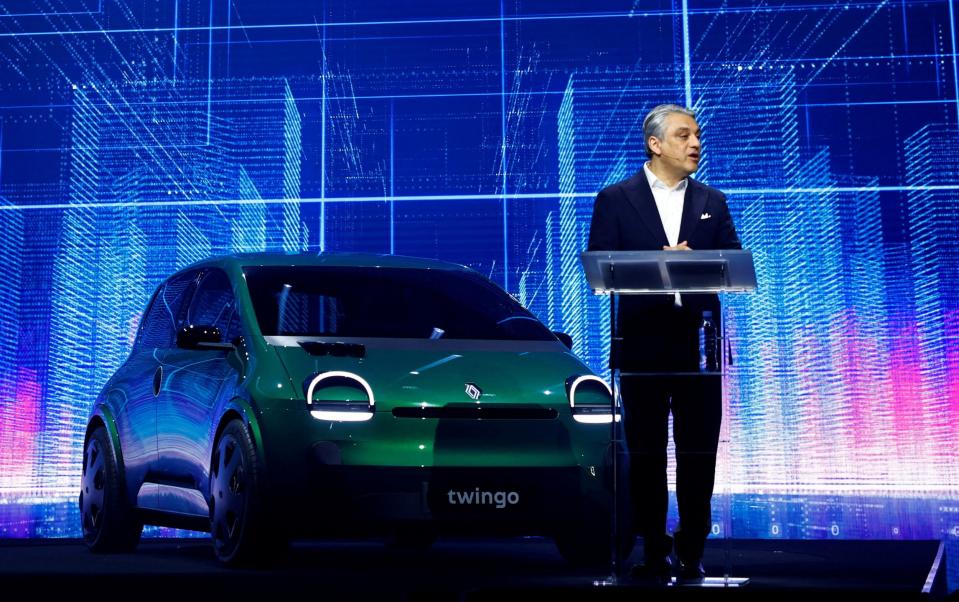Britain must work with EU to halt onslaught of Chinese EVs, warns Renault

Britain and Europe must work together to resist an onslaught of cheap Chinese electric vehicles (EVs), the boss of Renault has warned.
Luca de Meo, chief executive of the French car maker, said the switch to greener vehicles posed the biggest challenge to the industry in 150 years, but warned companies were being over-regulated and lacked financial support.
He accused European governments of focusing on “deadlines and fines” while the US and China backed their homegrown automotive companies with generous subsidies and supportive industrial policies.
His comments come as car makers on the Continent struggle with slowing demand for EVs and the threat of cheaper competition from China.
China surpassed Japan last year to become the world’s biggest exporter of cars, with more than 460,000 Chinese-made vehicles registered in Europe during the first nine months of 2023.
A shipment of 5,000 electric vehicles made by Shenzhen-based BYD is currently on its way to Europe, according to reports, aboard a cargo ship called Explorer.
The company has been busy acquiring its own fleet of special car-carrier ships following a global shortage of the vessels, which has been constraining Chinese exports.
Critics have long argued that while the UK and the European Union have focused heavily on banning future petrol car sales by 2035, they have offered comparatively little in the way of incentives for consumers to switch to EVs.
Writing in an op-ed for the magazine Autocar, Mr Meo said: “For us Europeans, these are challenging times. But are we fully aware of what is at stake?
“The UK may no longer be part of the EU, but on this issue I think we face the same challenges together.
“It is very simple: strip out the automotive industry and Europe will find itself with a structural trade deficit.
“With the internal combustion engine, our leadership was undisputed. For a century, we benefited from our expertise with this technology, and it was a barrier to entry for newcomers to the industry.
“Today, Europeans find themselves in a position of relative fragility.”
Mr Meo criticised flip-flopping on rules for vehicle emissions and pointed to China’s global dominance over battery production, warning that previous certainties were being “shaken”.
Last year, Rishi Sunak delayed the UK’s ban on sales of new petrol cars from 2030 to 2035, while the EU also watered down emissions rules due to come into force in 2035 to allow cars powered by synthetic fuels to continue being sold, following last-minute demands from Germany.
Mr Meo added: “In addition, while the Americans massively stimulate and incentivise the industry and the Chinese organise it through planning, we Europeans regulate, often with no coherence and without any holistic view of our challenges.”
Europe needs a “one stop shop” for regulation on zero-emission vehicles, rather than different rules in various countries, he said, as well as more government support for companies.
Mr Meo also called for car makers to have “a say in how [decarbonisation] is achieved”, raising the prospect of “a principle of technological neutrality” that could see technologies such as hydrogen-fueled cars play a bigger role.
He also suggested that policies should encourage “European champions to emerge in key technologies”, following the example of plane maker Airbus.
Mr Meo added: “Having devoted all my career to this industry, I see the question set before us today as pretty simple: does Europe have the will to finally equip itself with a genuine industrial policy for our sector… instead of just piling up deadlines and fines?
“Faced with the challenge from China and the US, Europe must invent its own model.
“A hybrid model between private initiative and public intervention should enable us first to protect and strengthen ourselves and then in the medium and long term go back on the offensive, always in a context of fairness and healthy competition.”
It is understood that the French government, which holds a 15pc stake in Renault, was made aware of Mr Meo’s comments in advance, although a Renault insider stressed that the chief executive did not speak for the Élysée Palace.
Europe is currently bracing for the arrival of cheaper EVs made by the likes of Chinese brands BYD, NIO, Chery, Geely and SAIC Motor.
The EU has launched an anti-subsidy investigation into Chinese EVs, raising the future prospect of tariffs, and has also urged European brands to develop their own more affordable models.
By the second half of last year, Chinese manufacturers had captured around 10pc of the European EV market, according to Schmidt Automotive Research.
Some are offering huge discounts of up to €12,000 to boost sales on the Continent, the firm added.
